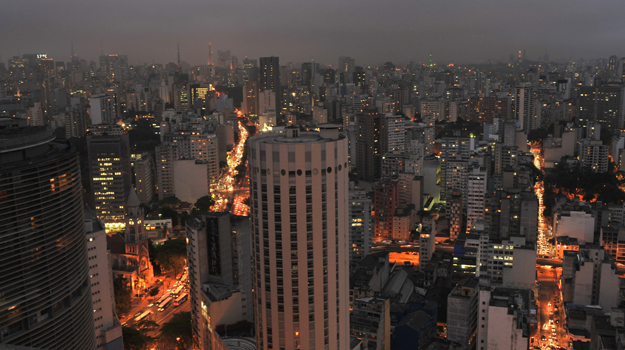Surviving Progress paints a bleak view of humanity’s future
 |
| Photo courtesy First Run Features |
| The Sao Paulo skyline as shown in the film. |
Questioning whether progress has actually occurred in the past 200 years is an audacious task in a film of less than 90 minutes. But directors Mathieu Roy and Harold Crooks make a noble attempt in their documentary Surviving Progress, which opens in New York on Friday and nationally on April 20.
The film, based on the book A Short History of Progress by Ronald Wright, is framed around the existential question: What is progress? Wright serves as a kind of moderator for the discussion between viewer and 20 authors, scientists, theorists, and activists — including Jane Goodall, Margaret Atwood, Stephen Hawking, and J. Craig Venter (the mapper of the human genome). They take up issues such as “progress traps” (what feels progressive but actually portends doom), pillaging of earth's natural resources, and the role of debt in human development, but the conversation is lopsided and self-affirming.
Right now, the documentary says, progress is tied to economic development, which leads to all sorts of practical, sociological, ecological, and environmental problems. Humans are consuming too much, reproducing too fast, and being systematically crushed by economic forces — all in the name of progress. While this might be profitable for a few right now, it puts our entire species in peril. Their points are driven home in the film’s cinematography. We get time-lapse shots of the disappearing Amazon rainforest and booming, pollution-billowing metropolises, both man-made catastrophes of the highest order. There are aerial shots of greed and subjugation in the form of gated communities on open tracts of verdant land that bleed into densely packed urban spaces where the only thing green is faded paint on a shanty. And Roy and Crooks recall the ultimate we’re-all-doomed documentary, Koyaanisqatsi, with montages of people, cars, and machinery choking the life out of our modern world.
Everyone seems to agree that the status quo is unsustainable. The economy must cease to be the engine that drives progress, and progress must be measured in a different way to ensure humanity’s survival. It's hard to argue the point since we are given few alternatives or little dissent. (The only time anything close to a debate occurs is when the film moves into discussing synthetic biology and genetic engineering.) In the end this view is probably right, but a fleshed out counter-argument — that “progress” has put humanity on a path to endless prosperity rather than imminent demise — would make the film rhetorically robust.
But time is the bigger problem here. Surviving Progress runs a meager 87 minutes. Topics such as progress traps, which will probably be new to laymen viewers, demand more oxygen, but they’re suffocated by an overlong discussion of debt and oligarchical control of societies. It’s an interesting subject, to be sure, but the economy has been endlessly picked over in countless documentaries over the past four years. Roy and Crooks could have distinguished their film in a crowded field by developing fresh areas of argument viewers likely haven’t confronted elsewhere.
What we’re left with is not so much a how-to on surviving progress but a warning call to evolve or die. This makes Surviving Progress compelling, but the film needs a good extra 30 minutes, at the very least, to provoke meaningful debate. And if ever a documentary deserved a few extra minutes, it’s this one.


Post a comment to this article
Report Abusive Comment